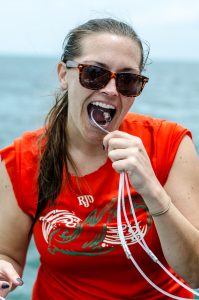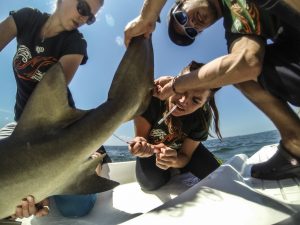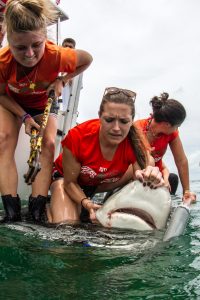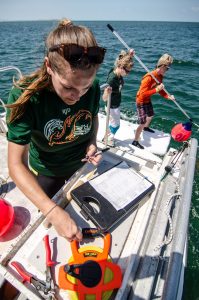Meet our team: Lindsay Jennings
1. What is your role in the lab?
My main responsibility in the lab is to manage our data. Each time the team goes on the boat for a shark tagging trip, we record important data about the sharks such as body measurements, the sex of the animal, its tag number, even its condition upon release. We also record environmental data including salinity, temperature, dissolved oxygen, and depth. All of this information needs to get collated and put into a master database to use later for our research and lab papers. Other databases which I keep up to date include our tiger shark database, a recapture database, and our morphology database which houses information on all sorts of body measurements of the sharks we catch. Additionally, for the past few years, I have had the opportunity to help assemble data and content for our Annual Reports, the latest of which can be seen here
2. Tell us a little about yourself
After graduating in December 2014, I have stayed with RJD to help with data management, but work in St. Petersburg, Florida where I went to Eckerd College to get my BSc in marine biology. While I am originally from northern Virginia, Florida and its warm waters kept calling. It’s probably no surprise that I love relaxing at the beach, sailing, kayaking, SCUBA diving or snorkeling – really anything water related. I also enjoy playing soccer recreationally in the Tampa Bay area, exploring new breweries or restaurants, and reading a good book (and most likely falling asleep) in a hammock
3. How did you get interested in marine biology and conservation?
I was one of those lucky kids who always knew what they wanted to do when they grew up. What I didn’t know was that my curiosity about dolphins would shift into a love and enthusiasm for sharks and their conservation. Shark Week was practically a religion in my household growing up, and it wasn’t until college that I realized that I had the opportunities to actually follow my passion. I knew that conservation was going to make me happy and fulfilled – seeing how research could be used to affect policy changes and ultimately lead to better stewardship of our oceans and its sharks. Marine science is a very large field, and it took me awhile to find my path, but I am proud to call myself a marine conservationist.
4. What’s your favorite part about working in the lab?
My favorite part about working in the lab has to be going on the boat to tag sharks with local high school students. The best parts about the trips are those split seconds when a drumline is being pulled up and no one knows yet whether we have caught a shark or what species it is. If we are lucky enough to have a shark on the line, our team turns into a well-oiled pit crew and we get all the crucial information we need, tag it, release it, and watch it swim away, within minutes. It’s always exciting yet humbling to know you’ve just played an integral part of shark research and conservation.
5. Is there anything else you’d like to say to our blog readers?
Shark research is an incredible thing to be a part of, from collecting data in the field to publishing papers to giving presentations to local communities. Unfortunately, it is not always a glamorous job, as a lot of hard work is put in behind the scenes from our entire team to make the lab run efficiently and effectively. I am extremely grateful and honored to be part of a team which shares the same love and passion for the oceans and sharks as I do, and I know this lab will see many more successes in its future.




